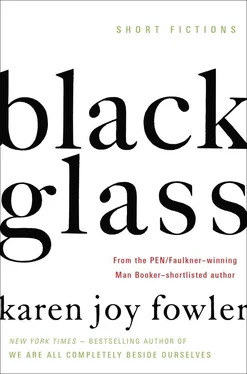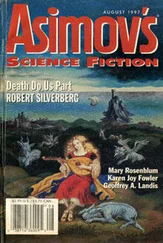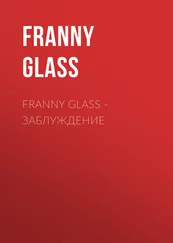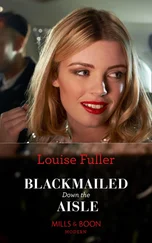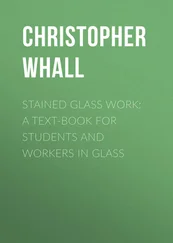When news reached home, the McBane wives and daughters armed themselves with kitchen knives and went in search of Ian. They thought he had lied about the unicorn horn; they thought he had knowingly substituted the inferior tooth of a fish instead. Ian was already gone, and with enough time and forethought to have removed every bottle of the unicorn brew and taken it with him. This confirmed the women’s suspicions, but the real explanation was different. Ian had every expectation the whiskey would work. When the McBanes returned, he didn’t wish to share any more of it.
The women set fire to his home and his brewery. Ian saw it from a distance, from a boat at sea, exploding into the sky like a star. The women dumped every bottle of whiskey they found until the rivers bubbled and the fish swam upside down. But none of the whiskey bore the unicorn label. Ian was never seen or heard from again.
“Whiskey is subtle stuff. It’s good for heartache; it works a treat against shame. But, even laced with unicorn horn, it cannot mend a man who has been split in two by a sword stroke. It cannot mend a man who no longer has a head. It cannot mend a man with a dozen arrows growing from his body like extra arms. It cannot give a man back his soul.”
The story seemed to be over, although Prince Charles had never appeared in it. Bobby had no feeling left in his hand. “I see,” he said politely.
McBean shook him once, then released him. He fetched a pipe. When he lit a match, he held it to his mouth and his breath flamed like a dragon’s. “What will I do to you if you tell anyone?” he asked Bobby. This was a rhetorical question. He continued without pausing. “Something bad. Something so bad you’d have to be an adult even to imagine it.”
• • •
SO BOBBY TOLD ME none of this. I didn’t see him again that day. He did not come by, and when I finally went over, his mother told me he was home, but that he was not feeling well, had gone to bed. “Don’t worry,” she said, in response, I suppose, to the look on my face. “Just a chill. Nothing to worry about.”
He missed school the next day and the next after that. When I finally saw him, he was casual. Offhand. As if it had all happened so long ago he had forgotten. “He caught me,” Bobby said. “He was very angry. That’s all. We better not do it again.”
It was the end of our efforts to put a Stuart on the throne. There are days, I admit, when I’m seeing the dentist and I pick up People in the waiting room and there they are, the current sad little lot of Windsors, and I have a twinge of guilt. I just didn’t care enough to see it through. I enjoyed Charles and Diana’s wedding as much as the next person. How was I to know?
Bobby and I were less and less friends after that. It didn’t happen all at once, but bit by bit, over the summer mostly. Sex came between us. Bobby went off and joined Little League. He turned out to be really good at it, and he met a lot of boys who didn’t live so near to us but had houses he could bike to. He dumped me, which hurt in an impersonal, inevitable way. I believed I had brought it on myself, leaving him that day, going home to a warm house and never saying a word to anyone. At that age, at that time, I did not believe this was something a boy would have done.
So Bobby and I continued to attend the same school and see each other about in our yards, and play sometimes when the game was big and involved other people as well. I grew up enough to understand what our parents thought of McBean, that he was often drunk. This was what had made his nose purple and made him rave about the Stuarts and made him slip in his snowy yard, his arms flapping like wings as he fell. “It’s a miracle,” my mother said, “that he never breaks a bone.” But nothing much more happened between Bobby and me until the year we turned sixteen, me in February, him in May.
He was tired a lot that year and developed such alarming bruises under his eyes that his parents took him to a doctor who sent him right away to a different doctor. At dinner a few weeks later, my mother said she had something to tell me. Her eyes were shiny and her voice was coarse. “Bobby has leukemia,” she said.
“He’ll get better,” I said quickly. Partly I was asking, but mostly I was warning her not to tell me differently. I leaned into her and she must have thought it was for comfort, but it wasn’t. I did it so I wouldn’t be able to see her face. She put her arm around me, and I felt her tears falling on the top of my hair.
Bobby had to go to Indianapolis for treatments. Spring came, and summer, and he missed the baseball season. Fall, and he had to drop out of school. I didn’t see him much, but his mother was over for coffee sometimes, and she had grown sickly herself, sad and thin and gray. “We have to hope,” I heard her telling my mother. “The doctor says he is doing as well as we could expect. We’re very encouraged.” Her voice trembled defiantly.
Bobby’s friends came often to visit; I saw them trooping up the porch, all vibrant and healthy, stamping the slush off their boots and trailing their scarves. They went in noisy, left quiet. Sometimes I went with them. Everyone loved Bobby, though he lost his hair and swelled like a beached seal and it was hard to remember that you were looking at a gifted athlete, or even a boy.
Spring came again, but after a few weeks of it, winter returned suddenly with a strange storm. In the morning when I left for school, I saw a new bud completely encased in ice, and three dead birds whose feet had frozen to the telephone wires. This was the day Arnold Becker gave me the message that Bobby wanted to see me. “Right away,” Arnie said. “This afternoon. And just you. None of your girlfriends with you.”
In the old days Bobby and I used to climb in and out each other’s windows, but this was for good times and for intimacy; I didn’t even consider it. I went to the front door and let his mother show me to his room as if I didn’t even know the way. Bobby lay in his bed, with his puffy face and a new tube sticking into his nose and down his throat. There was a strong, strange odor in the room. I was afraid it was Bobby and wished not to get close enough to see.
He had sores in his mouth, his mother had explained to me. It was difficult for him to eat or even to talk. “You do the talking,” she suggested. But I couldn’t think of anything to say.
And anyway, Bobby came right to the point. “Do you remember,” he asked me, “that day in the McBean cellar?” Talking was an obvious effort. It made him breathe hard, as if he’d been running.
Truthfully, I didn’t remember. Apparently I had worked to forget it. I remember it now, but at the time, I didn’t know what he was talking about.
“Bonnie Prince Charlie,” he said, with an impatient rasp so I thought he was delirious. “I need you to go back. I need you to bring me a bottle of whiskey from McBean’s cellar. There’s a unicorn on the label.”
“Why do you want whiskey?”
“Don’t ask McBean. He’ll never give it to you. Just take it. You would still fit through the window.”
“Why do you want whiskey?”
“The unicorn label. Very important. Maybe,” said Bobby, “I just want to taste one really good whiskey before I die. You do this and I’ll owe you forever. You’ll save my life.”
He was exhausted. I went home. I did not plan to break into McBean’s cellar. It was a mad request from a delusional boy. It saddened me, but I felt no obligation. I did think I could get him some whiskey. I had some money, I would spare no expense. But I was underage. I ate my dinner and tried to think who I could get to buy me liquor, who would do it, and who would even know a fine whiskey if they saw one. And while I was working out the problem I began, bit by bit, piece by piece, bite by bite, to remember. First I remembered the snow, remembered standing by the tree watching the cellar window with snow swirling around me. Then I remembered offering to shovel the walk. I remembered the footprints leading into the cellar window. It took all of dinner, most of the time when I was falling asleep, some concentrated sessions when I woke during the night. By morning, when the sky was light again, I remembered it completely.
Читать дальше
